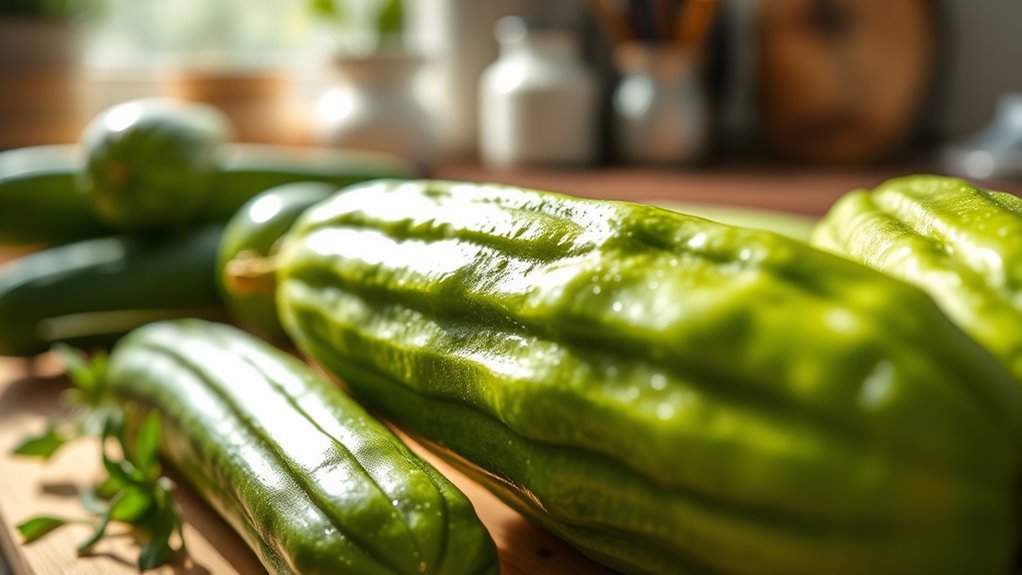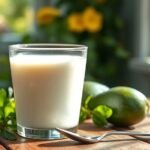Yes, you can have pickles on a keto diet! Dill pickles are low in carbs, typically containing just 1-2 grams per serving, and they’re a great source of probiotics that support gut health. However, be cautious with varieties like bread and butter pickles, which often have added sugars. Moderation is key due to their high sodium content. If you’re curious about creative ways to enjoy pickles while sticking to keto guidelines, there’s more to explore!
Understanding the Nutritional Profile of Pickles
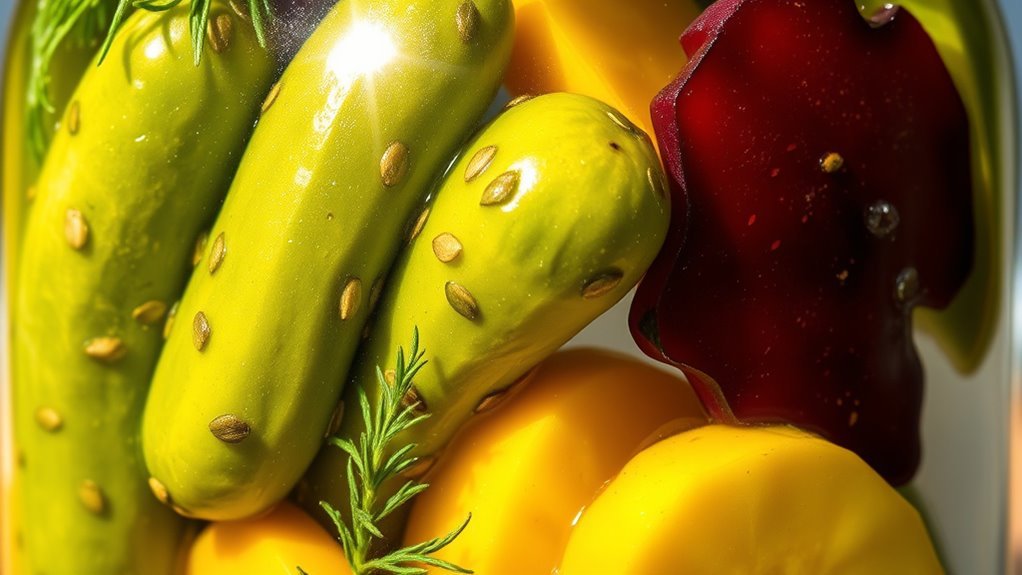
When you’re following a keto diet, understanding the nutritional profile of pickles can be quite beneficial. Pickles, particularly cucumber varieties, are low in carbohydrates, making them a suitable snack for keto enthusiasts. The fermentation process used in making some pickles can also introduce probiotics, promoting gut health. However, not all pickle varieties are created equal; some may contain added sugars or high-carb ingredients. It’s essential to read labels to guarantee you’re choosing options aligned with your dietary goals. Additionally, the sodium content in pickles can be high, so moderation is key. Overall, pickles can be a flavorful, crunchy addition to your keto meals, offering both versatility and a satisfying crunch while keeping carbs low. Including probiotics that support gut health can further enhance the benefits of incorporating pickles into your diet.
Types of Pickles Suitable for a Keto Diet
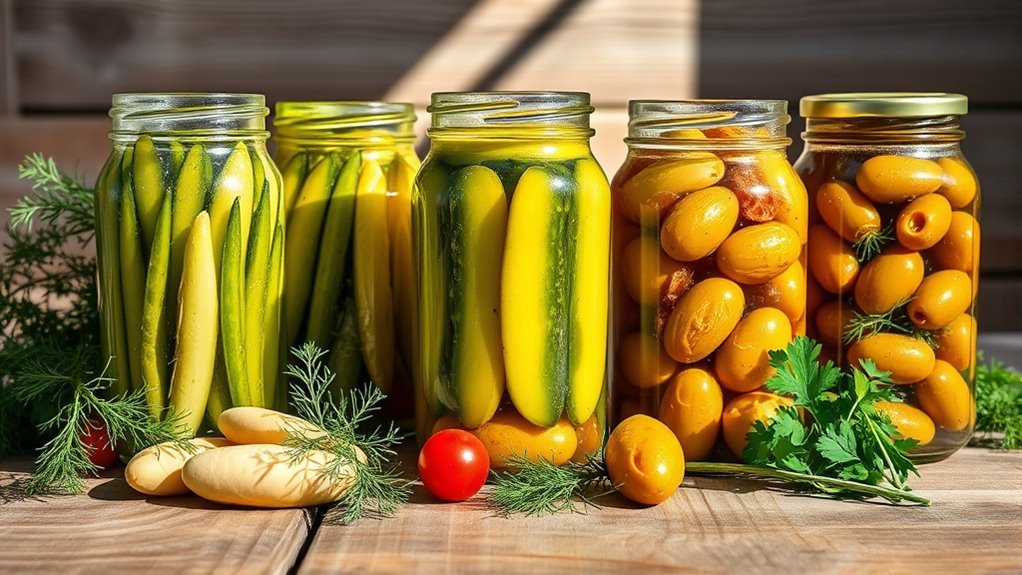
Although many pickles can fit into a keto diet, not all varieties are equally suitable. Here are some types to take into account:
Not all pickles are keto-friendly; consider dill and fermented varieties for low-carb options.
- Dill Pickles: Low in carbs and often made without added sugars, they’re a classic choice.
- Fermented Varieties: These offer probiotic benefits and typically have minimal carbs, enhancing gut health.
- Bread and Butter Pickles: While delicious, these usually contain sugar, so it’s best to avoid them.
- Pickle Substitutes: If you’re looking for alternatives, try pickled radishes or cucumbers in vinegar for a low-carb crunch. Incorporating fermentation process in your diet can boost overall health and support your keto journey.
Carbohydrate Content in Different Pickle Varieties
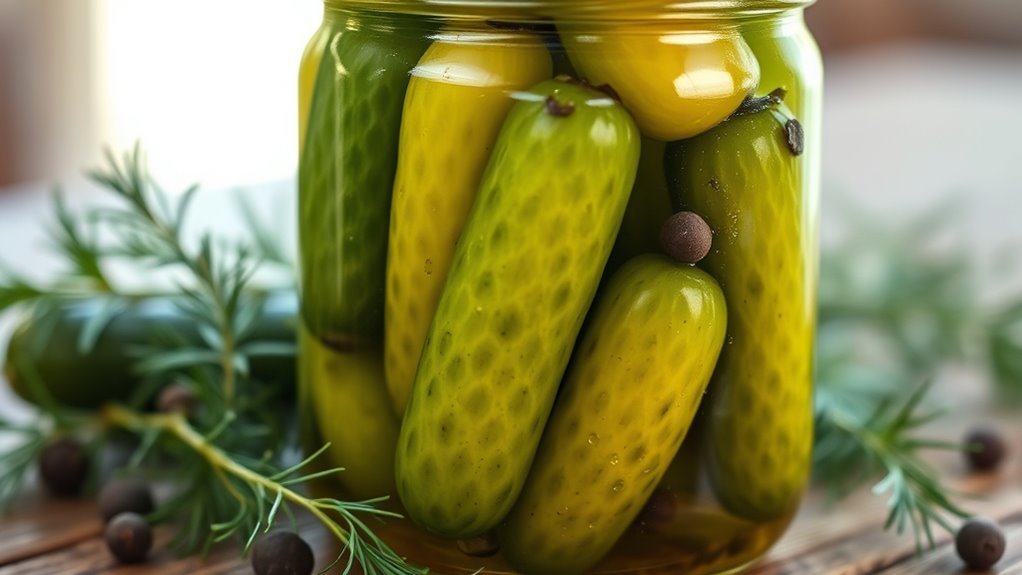
When you’re considering pickles on a keto diet, it’s important to know the carbohydrate content in different varieties. For instance, dill pickles generally have fewer carbs compared to sweeter options like bread and butter pickles. Understanding these differences can help you make better choices while staying within your carb limits.
Dill Pickles Nutrition Facts
Dill pickles are a popular snack choice, especially for those on a keto diet, thanks to their low carbohydrate content. They offer a variety of nutritional benefits that make them a smart addition to your meals. Here’s a quick look at their key nutritional aspects:
- Carbohydrates: Typically contain about 1-2 grams of carbs per serving.
- Calories: Low-calorie option, averaging around 5 calories for one dill pickle.
- Vitamins: Rich in vitamin K, which supports bone health.
- Electrolytes: Good source of sodium, helping with hydration and muscle function.
Including dill pickles in your diet can satisfy your cravings while keeping your carb intake in check, allowing you the freedom to enjoy flavorful snacks. Additionally, the low-carb nature of dill pickles makes them an ideal component for those following a keto lifestyle.
Bread and Butter Pickles
While dill pickles are a keto-friendly option, bread and butter pickles can pose a challenge due to their higher carbohydrate content. These pickles are typically made with sugar, which increases their carb count considerably. Depending on the brand, a single serving may contain over 10 grams of carbs, making them less ideal for a strict keto diet. If you’re craving that sweet flavor, consider experimenting with sweeteners alternatives like erythritol or stevia, which can provide a similar taste without the carbs. It’s also worth noting that some artisan brands might use different bread types or recipes, so always check the label. By being mindful, you can still enjoy pickles while staying within your keto goals. Additionally, it’s important to monitor your nutrient intake to avoid deficiencies when following a restrictive diet like keto.
Homemade vs. Store-Bought Pickles: What to Consider
When choosing between homemade and store-bought pickles, it’s essential to evaluate the ingredients and their nutritional value. Store-bought options often contain added sugars and preservatives that can impact your keto diet, while homemade pickles allow you to control what goes in. Understanding these differences can help you make a more informed decision that aligns with your dietary goals.
Ingredients and Nutritional Value
Understanding the ingredients and nutritional value of pickles is essential, especially if you’re following a keto diet. Whether you choose homemade or store-bought options, knowing what goes into your pickles can impact your health.
Here are some key considerations:
- Pickling Methods: Traditional methods often use natural fermentation, while quick methods may rely on vinegar.
- Vinegar Types: Different vinegars (like apple cider or white) can affect flavor and acidity levels.
- Sodium Content: Store-bought pickles can be high in sodium, which may impact your diet.
- Additives: Check for preservatives and artificial ingredients in commercial varieties that could conflict with keto guidelines. Additionally, being mindful of electrolyte imbalances when consuming high-sodium foods is crucial, especially during the transition to a ketogenic diet.
Sugar Content Differences
Sugar content is an essential factor to take into account when choosing between homemade and store-bought pickles, especially on a keto diet. Homemade pickles often allow you to control the ingredients, making it easier to use sugar alternatives or pickle sweeteners that fit your dietary needs. On the other hand, many store-bought brands may contain hidden sugars that can stall your keto progress.
Here’s a quick comparison:
| Type | Sugar Content (per serving) | Common Sweeteners |
|---|---|---|
| Homemade Pickles | 0-2g | Erythritol, Stevia |
| Store-Bought Pickles | 2-8g | High Fructose Corn Syrup |
Choosing wisely can help you enjoy pickles without compromising your keto goals. Remember that managing carbohydrate intake is crucial for maintaining ketosis, so always check labels carefully.
Health Benefits of Including Pickles in Your Diet
While you might think of pickles as just a tangy snack, they actually offer several health benefits that can complement your keto diet. Here are some key advantages of including pickles:
Pickles are more than a snack; they provide health benefits that support your keto diet.
- Low in Calories: Pickles are low-calorie, making them a guilt-free addition to your meals.
- Digestive Support: Fermented pickles contain probiotics that can enhance gut health and aid digestion.
- Rich in Antioxidants: They’re packed with vitamins and antioxidants, helping to fight inflammation.
- Hydration: Pickles can contribute to your hydration needs, especially if you’re sweating more on a keto plan.
Creative Ways to Enjoy Pickles on Keto
How can you elevate your meals with the tangy crunch of pickles on a keto diet? One creative way is to whip up some delicious pickle dips. Combining cream cheese or Greek yogurt with chopped pickles creates a flavorful dip for your favorite low-carb veggies. You can also enjoy pickle snacks by wrapping slices of pickles around deli meats or cheese for a satisfying bite. For a revitalizing salad, add chopped pickles to your leafy greens, avocado, and a zesty dressing. Pickle-flavored snacks, like baked pickle chips, can satisfy your cravings while staying keto-friendly. These ideas not only add variety but also let you enjoy the unique flavor of pickles without compromising your dietary goals.
Tips for Moderation and Portion Control
When incorporating pickles into your keto diet, it’s essential to practice moderation and portion control to maintain your nutritional goals. Here are some tips to help you enjoy pickles without overdoing it:
- Know your portion sizes: Stick to a small serving, ideally 1-2 pickles, to keep your carb intake in check.
- Choose low-sugar options: Look for brands that use natural ingredients and have minimal added sugars.
- Practice mindful eating: Savor each bite to enhance your dining experience and recognize when you’re satisfied.
- Balance with other foods: Pair pickles with low-carb proteins or healthy fats to create a well-rounded meal. Additionally, consider incorporating healthy fats like those found in olives to complement your pickles and enhance your overall nutrition.
Frequently Asked Questions
Can Pickles Trigger Cravings for Non-Keto Foods?
Pickles can sometimes act as craving triggers, especially if you associate their taste with non-keto foods. The vinegar and salt can stimulate your appetite, making you crave more. If you find that pickles lead to unwanted cravings, consider alternatives like cucumber slices or celery sticks, which offer crunch without the potential triggers. Staying mindful of your reactions can help you maintain your keto journey while enjoying flavorful options.
Are There Any Pickles to Avoid on Keto?
When it comes to your keto journey, it’s wise to steer clear of sweet pickles. They’re often packed with sugar, which can cramp your low-carb style. Dill pickles, on the other hand, are typically a great choice, as they’re low in carbs and often sugar-free. Just be sure to check labels for any hidden carbs or added sugars that might sneak in. Embrace the crunch of dill pickles while keeping your goals in check!
How Should Pickles Be Stored for Freshness?
To keep your pickles fresh, always store them in the refrigerator after opening. Choose jars that are airtight to prevent moisture from spoiling them. Refrigeration tips include ensuring the brine covers the pickles completely and avoiding contamination by using clean utensils. If you’re making your own, select high-quality ingredients for the best flavor and longevity. With proper storage, you can enjoy your pickles for weeks without losing that satisfying crunch!
Can I Eat Pickles Every Day on Keto?
Yes, you can eat pickles every day on keto! They’re low in carbs and offer some great pickle benefits, such as aiding digestion and providing antioxidants. Just keep an eye on your daily servings—moderation is key. While pickles can be a tasty snack or condiment, too much sodium from pickles can lead to health issues. Enjoy them, but balance them with other low-carb foods for ideal health on your keto journey!
Do Pickles Have Any Hidden Sugars or Additives?
Yes, some pickles can have hidden sugars or additives. When you’re checking the labels, look for hidden ingredients like high fructose corn syrup or preservatives, which can increase the sugar content. Opt for dill pickles or those labeled “sugar-free” to keep your carb intake low. Always read labels carefully; even a small amount of sugar can affect your keto goals. Stay informed, and you’ll enjoy pickles without worry!
References
- https://www.healthline.com/nutrition/keto-diet-foods#pickles
- https://www.medicalnewstoday.com/articles/324653
- https://www.webmd.com/diet/obesity/what-is-the-keto-diet
- https://www.ncbi.nlm.nih.gov/pmc/articles/PMC6410967/
- https://www.dietdoctor.com/low-carb/keto
- https://www.reuters.com/article/us-health-keto-idUSKBN1W62D2
- https://www.verywellfit.com/keto-diet-foods-5110907
- https://www.nutrition.gov/topics/whats-food/nutrition-basics/keto-diet
- https://www.cdc.gov/healthyweight/healthy_eating/index.html
